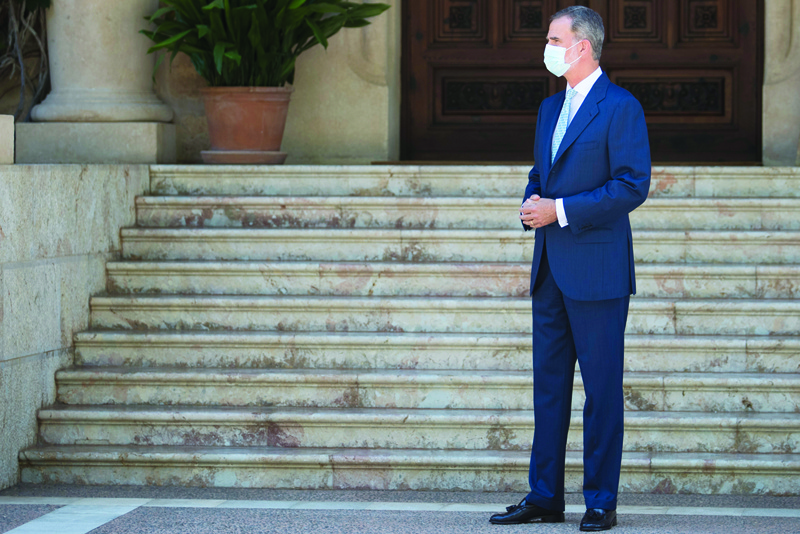 PALMA: Spanish King Felipe VI waits for the arrival of the Spanish prime minister ahead of a meeting at the royal family's summer residence at the Marivent Palace in Palma de Mallorca yesterday. - AFP
PALMA: Spanish King Felipe VI waits for the arrival of the Spanish prime minister ahead of a meeting at the royal family's summer residence at the Marivent Palace in Palma de Mallorca yesterday. - AFPMADRID: A year after Spain's former King Juan Carlos went into self-imposed exile in the face of mounting questions over his finances, he remains under a cloud of suspicion that complicates his return home. He announced on August 3, 2020 he was moving abroad to prevent his personal affairs from undermining his son King Felipe VI's reign and sullying the monarchy. But his choice of new home-the United Arab Emirates, where some of his business affairs triggered the scandals that tainted his reputation in the first place-only raised Spaniards' eyebrows further.
Juan Carlos has told his son that he would like to return to Spain "but he won't come back without the approval" of the royal household, said Jose Apezarena, the author of several books on Felipe. And the position of the royals is that "until his legal problems end, he should not return", Apezarena told AFP. The 83-year-old former king is the target of three separate investigations over his financial dealings, including those linked to a high-speed rail contract in Saudi Arabia that was awarded to a Spanish consortium. Prosecutors in Spain and Switzerland are looking into suspicions he received kickbacks for facilitating the deal.
The suspicions center on $100 million (85 million euros) that Saudi Arabia's late King Abdullah allegedly deposited in 2008 into a Swiss bank account to which Juan Carlos had access. The other two investigations concern the alleged existence of a trust fund in Jersey linked to Juan Carlos and the undeclared use of credit cards linked to accounts not registered in his name, a possible money-laundering offence.
'Very bored'
Spanish monarchs have immunity during their reign but Juan Carlos abdicated in 2014 following a series of health problems and embarrassing revelations about his personal life, leaving himself vulnerable to prosecution. While he has not been charged with any crime, the probes have tainted his reputation as a leader of Spain's democratic transition following the dictatorship of General Francisco Franco. Outside of the Royal Palace in central Madrid, opinions were divided.
"He is being judged without any evidence, he should be able to come home if that's what he wants," said Pura Fernandez, 46, a bank worker. But delivery rider Angel Galan, 27, was less sympathetic. "He may have done some great things for Spain but if he committed irregularities I am not sad that he is gone," he said. While in exile, Juan Carlos has twice settled tax debts with Spanish authorities for a total of more than five million euros. But he has otherwise kept a low profile at the villa on the island of Nurai off the coast of Abu Dhabi where he now lives. "He is alone and very bored," said Apezarena.
'Not normal'
When reports emerged in February that Juan Carlos was in poor heath, the former monarch told online Spanish daily OKDiario he was "well, exercising two hours daily" in his only comments to the media since moving abroad. Abel Hernandez, a journalist and expert on the monarchy, said he believes Juan Carlos will return to Spain by the end of the year. "He has not been charged with anything and has regularised his situation with the tax office. It does not seem normal that he remains outside of the country," Hernandez told AFP.
The scandals swirling around Juan Carlos have provided ammunition for those wanting to abolish the monarchy. The far-left party Podemos, which is the junior partner in Spain's coalition government, has called for a parliamentary investigation into Juan Carlos's wealth. Felipe, meanwhile, has sought to distance himself from his father.
Last year the king renounced his inheritance from Juan Carlos, and stripped the ex-monarch of his palace allowance after new details of his allegedly shady dealings emerged. Polls show support for the monarchy has inched up since Juan Carlos moved abroad although a survey published Sunday in conservative daily La Razon found 42.9 percent of Spaniards feel Juan Carlos's legal woes were hurting Felipe's reign. - AFP









